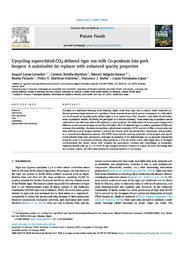Please use this identifier to cite or link to this item:
https://hdl.handle.net/11000/35008Full metadata record
| DC Field | Value | Language |
|---|---|---|
| dc.contributor.author | Lucas González, Raquel | - |
| dc.contributor.author | Botella Martínez, Carmen María | - |
| dc.contributor.author | Salgado Ramos, Manuel | - |
| dc.contributor.author | Pallarés, Noelia | - |
| dc.contributor.author | Martinez Culebras, Pedro Vicente | - |
| dc.contributor.author | Barba, Francisco Jose | - |
| dc.contributor.author | Fernandez-Lopez, Juana | - |
| dc.contributor.other | Departamentos de la UMH::Tecnología Agroalimentaria | es_ES |
| dc.date.accessioned | 2025-01-20T10:13:20Z | - |
| dc.date.available | 2025-01-20T10:13:20Z | - |
| dc.date.created | 2025-01-17 | - |
| dc.identifier.citation | Future Foods. Volume 11, June 2025, 100542 | es_ES |
| dc.identifier.issn | 2666-8335 | - |
| dc.identifier.uri | https://hdl.handle.net/11000/35008 | - |
| dc.description.abstract | Horchata is a traditional beverage from Valencia, Spain, made from tiger nuts (a tuber), which industrial production generates large amounts of co-products. These co-products are rich in several compounds (i.e. oil), which can be extracted by applying green technologies such as supercritical-CO2. However, even after oil extraction, some co-products remain. Following the principles of a circular economy, these remaining co-products can be reintroduced into the food chain as fat replacers in meat products. The study aimed to develop pork burgers with different concentrations of supercritical-CO2 (29.5 MPa, 45.8 °C) defatted tiger nut milk co-products (DTNC) and evaluate their stability, chemical composition, and physical properties. DTNC are rich in fiber and minerals, and their addition to pork burgers resulted in reduced fat content while increasing fiber, magnesium, and potassium in a concentration-dependent manner. The DTNC improved the cooking properties of the burgers and significantly affected their color and texture. Although the presence of the defatted tiger nut co-products reduced the scores for most of the sensory attributes, when added up to 3 %, all of them were rated higher than 5. At higher concentrations, the lowest values were obtained for granularity, juiciness and crumbliness. In conclusion, replacing backfat with up to 3 % DTNC in pork burgers provides a method to reduce fat while increasing fiber and mineral content, all while maintaining the expected qualities of the burger | es_ES |
| dc.format | application/pdf | es_ES |
| dc.format.extent | 10 | es_ES |
| dc.language.iso | eng | es_ES |
| dc.publisher | Elsevier | es_ES |
| dc.rights | info:eu-repo/semantics/openAccess | es_ES |
| dc.rights | Attribution-NonCommercial-NoDerivatives 4.0 Internacional | * |
| dc.rights.uri | http://creativecommons.org/licenses/by-nc-nd/4.0/ | * |
| dc.subject | Valorization | es_ES |
| dc.subject | New ingredients | es_ES |
| dc.subject | Fiber | es_ES |
| dc.subject | Coproducts | es_ES |
| dc.subject | Supercritical fluid extraction | es_ES |
| dc.title | Upcycling supercritical-CO2-defatted tiger nut milk Co-products into pork burgers: A sustainable fat replacer with enhanced quality properties | es_ES |
| dc.type | info:eu-repo/semantics/article | es_ES |
| dc.relation.publisherversion | https://doi.org/10.1016/j.fufo.2025.100542 | es_ES |

View/Open:
Upcycling supercritical-CO2-defatted ti...pdf
14,63 MB
Adobe PDF
Share:
.png)
